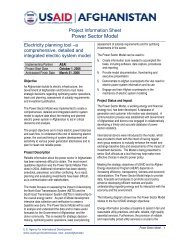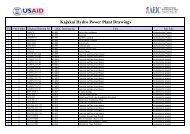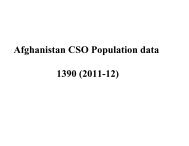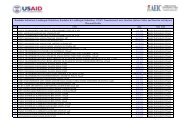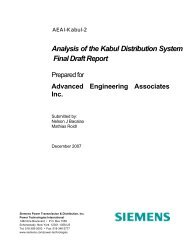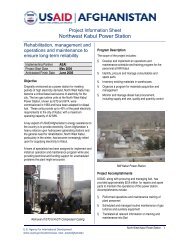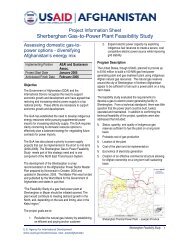prioritization and implementation plan - Cooperazione Italiana allo ...
prioritization and implementation plan - Cooperazione Italiana allo ...
prioritization and implementation plan - Cooperazione Italiana allo ...
Create successful ePaper yourself
Turn your PDF publications into a flip-book with our unique Google optimized e-Paper software.
the use of budgets <strong>and</strong> special accounts, especially<br />
with regard to financial management st<strong>and</strong>ards,<br />
eligibility for participation in the program, <strong>and</strong><br />
prohibitions on the use of cash to resolve local<br />
grievances.<br />
Appraisal – The APRP integrates lessons <strong>and</strong> best<br />
practices from past Disarmament, Demobilization,<br />
<strong>and</strong> Reintegration <strong>and</strong> peacebuilding efforts in<br />
Afghanistan <strong>and</strong> around the world. Information<br />
management <strong>and</strong> confidence-building activities are<br />
key to meeting the challenges associated with<br />
reintegration.<br />
APRP Action Plan – The action <strong>plan</strong> included in<br />
Volume II of the ANDS Prioritization <strong>and</strong><br />
Implementation Plan outlines the Government’s<br />
comprehensive approach to delivering peace <strong>and</strong><br />
reintegration based on the recommendations of the<br />
Consultative Peace Jirga.<br />
CURBING THE TRADE AND HARMFUL EFFECTS OF NARCOTICS<br />
Counter-narcotics (CN) is among the most pivotal<br />
issues in Afghanistan. Much has been written<br />
about the direct impact narcotics cultivation <strong>and</strong><br />
trade has had on security, governance, corruption,<br />
the economy, social issues, <strong>and</strong>, not least,<br />
Afghanistan’s st<strong>and</strong>ing in the international<br />
community <strong>and</strong> its relations with its neighbors. The<br />
Ministry of Counter-Narcotics is as a member of<br />
the Government’s Agriculture <strong>and</strong> Rural<br />
Development Cluster. However, it is imperative<br />
that CN, as a cross-cutting issue, is integrated into<br />
the four other clusters – the Governance, Economic<br />
<strong>and</strong> Infrastructure Development, Human Resource<br />
Development, <strong>and</strong> Security Clusters. CN’s<br />
integration into these clusters carries three main<br />
action points based on an Afghan perspective:<br />
First, the Government, with support from its<br />
international <strong>and</strong> national partners, needs to<br />
review, integrate, <strong>and</strong> implement a more effective,<br />
coherent, <strong>and</strong> pragmatic National Drug Control<br />
Strategy (NDCS) to address narcotics issues<br />
comprehensively <strong>and</strong> in a sustainable manner.<br />
Second, the Ministry of Counter-Narcotics is<br />
m<strong>and</strong>ated to coordinate NDCS <strong>implementation</strong><br />
efforts through clearly-defined partnership roles<br />
<strong>and</strong> responsibilities, along with line ministries,<br />
sub-national administration, <strong>and</strong> the international<br />
community, through a series of consultations<br />
during <strong>and</strong> following the Kabul Conference.<br />
Third, while counter-narcotics efforts have, in the<br />
past, been hindered by various external <strong>and</strong><br />
internal factors (many of which have not been<br />
collectively addressed by CN implementers), the<br />
Kabul Conference provides an opportunity to<br />
introduce an Afghan CN perspective viewed as a<br />
“new beginning” in Afghanistan’s transition away<br />
from narcotics production <strong>and</strong> trade towards<br />
alternative <strong>and</strong> sustainable livelihoods.<br />
How does the CN new beginning initiative reflect<br />
the Afghan perspective? There are five points that<br />
deserve serious consideration <strong>and</strong> underst<strong>and</strong>ing<br />
by both the Government <strong>and</strong> international<br />
community.<br />
1. The CN new beginning initiative is an Afghanled,<br />
nationwide effort that is Afghan-owned <strong>and</strong><br />
Afghan implemented. With full respect for<br />
Afghanistan’s integrity as a sovereign country, the<br />
new beginning perspective recognizes that<br />
Afghanistan is willing <strong>and</strong> capable of dismantling<br />
the illegal economy that has spread its tentacles<br />
into almost every sector of Afghan society, <strong>and</strong><br />
which has profound negative effects on<br />
neighboring countries <strong>and</strong> beyond.<br />
2. CN, as a cross-cutting issue, is a development<br />
agenda priority in Afghanistan. Without serious<br />
integration <strong>and</strong> concerted actions – implemented<br />
within the national priority program formulation,<br />
<strong>implementation</strong>, monitoring <strong>and</strong> evaluation<br />
modalities for all Government clusters – overall<br />
Afghanistan development efforts will remain<br />
locked in limbo. While the National Drug Control<br />
Strategy <strong>and</strong> CN law prioritize CN in the<br />
development agenda, CN can no longer remain<br />
simply a policy on paper. CN policy must translate<br />
into positive actions, implemented by line<br />
42




